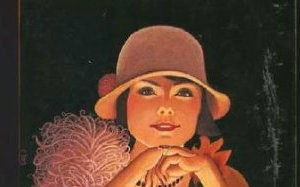Blogs
A Taste of Bates

A Taste of Bates
Review of “Love for Lydia” by H.E.Bates
I remember watching the TV series “Love for Lydia” in the late 1970’s. Though I remembered little about the plot and even less about the actors or the acting, I do know I was absolutely bowled over by it. I always meant to read the book but never got around to it. Then, a few years ago, I heard the odd part read on Radio 4. Again, I thought I must read it. Again I forgot about it. I’m not sure what brought it back into my mind. I believe the book may now be out of print. The 2007 edition I found on Play.com is an excellent condition second hand copy.
The story is told in a slow ponderous style, very different from the modern pacy novels I have been reading lately and it took me a while to get into it, in part because I had to keep checking back to understand what was going on. Once I had got used to it though I was absolutely captivated. It’s one of those books that’s worth reading for the use of words alone. It’s poetic, lyrical, melodic. The descriptions are just wonderful. Here is how the narrator describes one of the Miss Aspen’s:
“As she spoke she ruffled up in her chair and no longer dumpling-like and rotund, seemed to be going through a process of an almost grotesque enlargement, fluffing herself out, sprouting wings. Like a hen about to spring up on a perch after laying an egg.”
By today’s standards the descriptions of the countryside and the setting are very long, but they are so beautiful. There are far too many to choose from, but here are just a few:
“The colour of the frozen afternoon, all apricot and bronze, came levelly across the ice in a startling horizontal fire”
“A lichen-like green hung above the sunset, and the shadows, all across the snow, became of indigo brilliance before finally dissolving.”
“The lilac and the chestnut flower, clogging the air with a haunting drowsy perfume that still rises, above all the smell of grass and bluebells and lilac and primrose, to mark the spring and summer that I spent there.”
This last quote also demonstrates perfectly the nostalgic, poignant feel of the novel, the feeling of someone looking back on a time fondly remembered, one that will never return.
Set between the first and second world wars the atmosphere evoked is of a perfect time. And even while the author is describing the present action he makes it clear he’s looking back on it: “Evensford in those days” “At that time” “Twenty years later”.
During the course of the book things already begin to change, presaging the future change brought about by the Second World War. In the few years spanned by the book the “ruling class” lose their power and the sway they hold over the “lower classes”. There is talk of them losing their money. Indeed the town of Evensford falls into decline with the coming of the “slump”, and unemployment as factories and workshops close down.
Against this background a love story is played out, one so naïve and poignant it tears at your heart strings. As the novel progresses the atmosphere becomes so dark and portentous you wonder where it’s going and almost dread reading it for fear of what is going to happen
I won’t spoil the ending for those who have not read it. I’ll simply say “Read it.” You won’t be disappointed. More than a classical work by a masterful writer, this is one of those books that will stay with you long after you’ve finished it.
Bethany Askew is the author of eight novels: The Time Before, The World Within, Out of Step, Counting the Days, Poppy's Seed, Three Extraordinary Years The Two Saras and I Know You, Don't I? She has also written a short story, The Night of the Storm, and she writes poetry. Two more women’s fiction books have been accepted for publication in 2020 and 2021 respectively and she is currently working on a new novel. In her spare time she enjoys reading, music, theatre, walking, Pilates, dancing and voluntary work. Bethany is married and lives in Somerset.
Recent Comments
- Bethany Askew on About the Author
- Louise Tyrrell on About the Author
- Bethany Askew on About the Author
- Yola Munro on About the Author
- Andrea crosland on About the Author
-
Latest Posts
Meta
Bethany Askew
Bethany Askew is the author of eight novels:
The Time Before, The World Within, Out of Step, Counting the Days, Poppy’s Seed, Three Extraordinary Years,The Two Saras and I know you, Don’t I?
She has also written a short story, The Night of the Storm, and she writes poetry.
Two more women’s fiction books have been accepted for publication in 2020 and 2021 respectively and she is currently working on a new novel.
In her spare time she enjoys reading, music, theatre, walking, Pilates, dancing and voluntary work.
Bethany is married and lives in Somerset.
-
My Twitter Feed
-
Today from Bethany Askew Novelist : Book Review: The Woman in the White Kimono by Ana Johns https://t.co/2J6L2spX7t... 4 years ago
-
Copyright - Bethany Askew 2009 - 2016 Follow @AskewBethany
